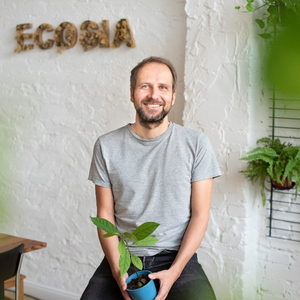Searching for a better world
Tired of tech giants profiting from your online activity? These startups put your clicks to better use.

Tired of the tech giants reaping billions from your online activity? These three internet startups are putting your scrolling to much better use.
Move over Google, Meta and Amazon. The B Corp movement is gaining momentum and these global guardians have their eyes on your turf.
We take a look at three startups that are leveraging purpose, ethics and accountability to disrupt online business models that have traditionally put profits first.
ECOSIA: The search engine that plants trees
If you like the idea of reforesting the globe while you search the web, look out for Ecosia’s search engine.
Ecosia generates ad revenue just like any other search engine, but instead of the profits being returned to shareholders, it uses these to fund global tree-planting efforts.
Of its profit, Ecosia donates 80 per cent to tree-planting organisations. On average, it takes around 45 searches to fund one new tree, and with over 20 million active users per month, it has planted more than 150 million trees.

Ecosia was founded in 2009 by German entrepreneur Christian Kroll after he saw the impact of deforestation first hand in South America while travelling. He set about building a business capable of continuously funding tree planting.
The profits made from searches on Ecosia’s browser are used to plant trees where they are needed most, focusing on biodiversity hotspots around the globe.
Unlike its for-profit counterparts, Ecosia doesn’t collect and sell its users’ data, and the platform also actively calls out greenwashing in its search results, using a rating that evaluates a company’s publicly available response to the climate crisis, and how likely it is to become carbon neutral by 2030.
“Our mission at Ecosia isn’t just about enabling you to plant trees with your searches – it’s about helping you make more informed decisions for the climate in your everyday life,” the company says.
“We make it easier for you to be climate active while navigating the many claims made by governments and companies around the world.”
WEARE8: Social media with a social conscience
This purpose-driven social media alternative gives its users a choice on whether to watch ads and if they choose to, they get fifty per cent of the spoils.
They can opt to keep these small payments for themselves or they can donate them to one of the platform’s charity partners.
Five per cent of profits go to charities and tree planting – in partnership with carbon offsetting platform Ecologi – and 5 per cent goes to a fund for hand-picked creators who contribute uplifting short-form story-telling content to the site.

WeAre8 was founded by London-based digital entrepreneur Sue Fennessy in 2012 to counter the toxic algorithms of existing social media platforms and to address a lack of effectiveness and transparency for brands in the $450bn digital ad market. In contrast to its for-profit counterparts, the app encourages users to disengage after just eight minutes, and WeAre8 takes a zero tolerance approach to hate speech or threats on its platform.
“This is advertising done in a way that puts people at the centre in every way,” Fennessy says.
“People are changing the world every time they’re watching ads and they’re making a positive impact. They’re getting paid and the attention is transformational as a result, when people feel valued.”
SMTHGOOD: A feel-good fashion app
A new arrival in the online fashion retail space is Smthgood, a Singapore social commerce app that launched in January this year with a focus on eco fashion.
The fast fashion industry is a major polluter, generating carbon emissions, microplastics, and consuming huge amounts of water. Smthgood, in contrast, is a fashion marketplace that’s focused on ‘conscious fashion’ brands.
The company defines conscious brands as those with positive environmental and social impact in their mission and operations. More than 60 small to medium-sized conscious fashion brands across Asia Pacific will be showcased on the web and mobile app.

Smthgood users collectively create a shoppable community using “Lookbooks”. This feature allows them to post their favourite outfits with the help of a virtual styling editor. If other users buy clothes directly off a Lookbook, its creator earns rewards in the form of Smthgood coins that are exchangeable for cashback on shopping.
AI-powered product tagging helps users to find outfits that match their style, the company says.
“With consumers becoming even more discerning in their purchasing choices, we see heightened awareness amongst consumers making choices in favour of conscious products, and support for brands that stand for more than profit,” Smthgood founder, Tony K Tan says.
“The decision to create Smthgood came after we saw that consumer buying behaviour continues to evolve and shift away from a purely transactional experience, and move towards one that is led by purpose, discovery, inspiration, and personalisation.”





